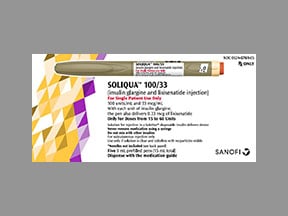
Soliqua Coupons & Savings Card – Discount Prices from $164.42
My prescription
Edit
5 solution pen-injectors 3ML of 100-33UNT-MCG/ML, Soliqua (1 Pen)
Select pharmacy

CVS
$164.42
COUPON PRICE
Walgreens
$165.32
COUPON PRICE
Walmart
$165.37
COUPON PRICE
Albertsons
$186.01
COUPON PRICESoliqua savings card
Show this card to your pharmacist
CVS
$164.42
BIN
ID
PCN
GRP
019876
LHF0C3A8E1
CHIPPO
LHX
Powered by
Price history for Soliqua
1 Pen, 3ML of 100-33UNT-MCG/ML
Average retail price for Soliqua
Average SaveHealth price for Soliqua
Our price history data is based on aggregated prescription data collected from participating pharmacies in America. Our prescription data updates daily to reflect the latest price changes. If you notice a missing data point, it means there wasn't sufficient data available to generate a monetary value for that date.
*Retail prices are based on pharmacy claims data, and may not be accurate when we don't have enough claims.
Soliqua dosage forms
Dosage Quantity Price from Per unit 3ML of 100-33UNT-MCG/ML 1 Pen $164.42 $164.42 3ML of 100-33UNT-MCG/ML 2 Pens $328.83 $164.41 3ML of 100-33UNT-MCG/ML 3 Pens $493.25 $164.42
| Dosage | Quantity | Price from | Per unit |
|---|---|---|---|
| 3ML of 100-33UNT-MCG/ML | 1 Pen | $164.42 | $164.42 |
| 3ML of 100-33UNT-MCG/ML | 2 Pens | $328.83 | $164.41 |
| 3ML of 100-33UNT-MCG/ML | 3 Pens | $493.25 | $164.42 |
Is Soliqua the same as Ozempic?
Soliqua and Ozempic are not the same. Soliqua is a combination of insulin glargine and lixisenatide, used to improve blood sugar control in adults with type 2 diabetes. Ozempic, on the other hand, contains semaglutide, which is a GLP-1 receptor agonist, also used to manage blood sugar levels in type 2 diabetes. They have different active ingredients and mechanisms of action.
What kind of insulin is Soliqua?
Soliqua is a combination insulin product that contains insulin glargine, a long-acting insulin, and lixisenatide, a GLP-1 receptor agonist. It is used to improve blood sugar control in adults with type 2 diabetes.
Can I lose weight on Soliqua?
Soliqua is primarily used to improve blood sugar control in adults with type 2 diabetes. While weight loss is not the primary purpose of Soliqua, some patients may experience weight loss as a side effect. However, individual results can vary, and it is important to follow a healthcare provider's guidance for managing weight and diabetes.
Who should not take Soliqua?
Soliqua should not be taken by individuals who have a personal or family history of medullary thyroid carcinoma or those with Multiple Endocrine Neoplasia syndrome type 2. It is also contraindicated in individuals with a known hypersensitivity to any of its components. Additionally, it should not be used by individuals with diabetic ketoacidosis or those who are under 18 years of age. It is important for patients to consult with their healthcare provider to determine if Soliqua is appropriate for their condition.
Which is better, Soliqua or Ozempic?
The choice between Soliqua and Ozempic depends on the individual's specific medical condition, treatment goals, and response to medication. Soliqua is a combination of insulin glargine and lixisenatide, while Ozempic is a GLP-1 receptor agonist. Each has its own benefits and potential side effects. A healthcare provider should evaluate the patient's medical history, current health status, and treatment objectives to determine the most appropriate option. It is important for patients to discuss with their healthcare provider to make an informed decision.
